History Of Basil: Its Origins And Uses
Basil is a fragrant herb that has been used for centuries in various cultures around the world. Its history can be traced back to ancient times, where it was used for medicinal and culinary purposes. Basil’s origins can be traced to the regions surrounding the Mediterranean Sea. However, it is believed that it was first cultivated in India, where it was called “tulsi”.
From India, basil spread to other parts of Asia, Europe, and Africa. The herb was especially popular in ancient Greece, where it was used to treat a variety of ailments. The Roman Empire also used basil extensively, both for its medicinal qualities and as a culinary ingredient. Basil was brought to the Americas by European colonists in the 17th century.
Today, basil is one of the most widely-used herbs in cooking around the world. Its fresh, bright flavor and aroma have made it a staple ingredient in many recipes. The herb is also known for its many health benefits. It is a rich source of vitamin K, which is essential for healthy bones and blood clotting. Basil also contains anti-inflammatory compounds that can help reduce inflammation in the body.
- Origins can be traced to regions surrounding the Mediterranean Sea
- First cultivated in India, where it was called “tulsi”
- Spread to other parts of Asia, Europe, and Africa
- Popular in ancient Greece and the Roman Empire
- Brought to the Americas by European colonists in the 17th century
Basil is used in many different types of cuisine, including Italian, Thai, and Indian. It pairs well with tomatoes, garlic, cheese, and other Mediterranean flavors. Fresh basil can be added to salads, pizzas, pasta dishes, and soups. It is also a key ingredient in the classic Italian sauce, pesto.
| Uses | Origins |
|---|---|
| Culinary | India |
| Medicinal | Mediterranean regions |
| Therapeutic | Greece and Rome |
Basil has a long and varied history, which can be seen in its many uses and cultural associations. From ancient civilizations to modern-day kitchens, this aromatic herb has stood the test of time and continues to be celebrated for its unique flavor and health benefits.
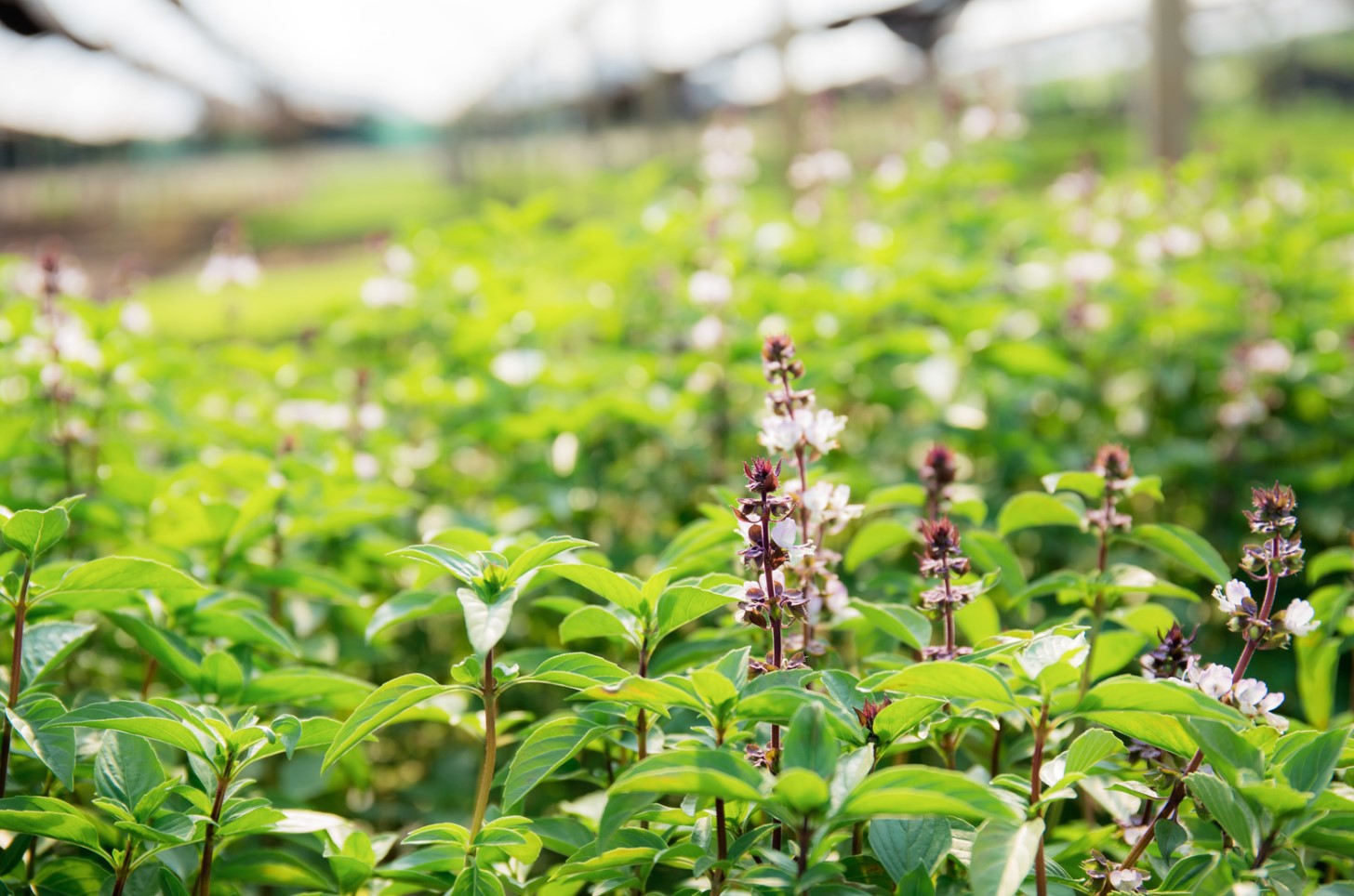
Various Types Of Basil And Their Flavor Profiles
There are many different types of basil available, each with their own distinctive flavor profile. Basil is a popular herb in many cuisines around the world and is known for its fresh, pungent aroma and taste. Below are some of the most common types of basil and the flavors they bring:
- Sweet Basil: This is the most commonly available type of basil and is probably what you picture when you think of the herb. Sweet basil has a bright, sweet flavor with hints of anise and clove. It is commonly used in Italian and Mediterranean cuisine.
- Thai Basil: This type of basil is native to Southeast Asia and is a staple in Thai, Vietnamese, and Cambodian cuisine. It has a spicy, licorice-like flavor with notes of mint and cinnamon.
- Lemon Basil: As the name suggests, this basil has a citrusy flavor that pairs well with fish, poultry, and salads. It has a bright, fresh taste with a hint of lemon.
- Holy Basil: Also known as tulsi, this type of basil is considered sacred in Hinduism and is used in many religious ceremonies. Holy basil has a spicy, peppery flavor with notes of clove and cinnamon. It is commonly used in Ayurvedic medicine for its medicinal properties.
In addition to these common types, there are many other varieties of basil available, each with their own unique flavor profiles. Purple basil has a slightly bitter, peppery taste with hints of anise, while cinnamon basil has a spicy, warm flavor with notes of cinnamon and clove.
Whatever type of basil you choose to use, it is important to remember that the flavor can vary depending on factors like growing conditions and maturity. It’s always best to taste a small piece before adding it to your dish to ensure that it complements the other flavors.
| Basil Type | Flavor Profile |
|---|---|
| Sweet Basil | Bright, sweet, with hints of anise and clove |
| Thai Basil | Spicy, licorice-like, with notes of mint and cinnamon |
| Lemon Basil | Bright, fresh, with a hint of lemon |
| Holy Basil | Spicy, peppery, with notes of clove and cinnamon |
Nutritional Value Of Basil: Vitamins And Minerals
Basil is a herb that is commonly used in various cuisines all over the world, but did you know that it is also packed with essential vitamins and minerals? This aromatic herb is not only added for flavor, but also for its nutritional benefits. Here are some examples of the vitamins and minerals found in basil:
- Vitamin K: Basil is rich in vitamin K, which plays an important role in blood clotting and bone health.
- Vitamin C: This essential vitamin is known for its immune-boosting properties and helps with the absorption of iron from plant-based sources.
- Vitamin A: Basil contains beta-carotene, which the body converts into vitamin A. This vitamin is important for eye health and immune function.
- Magnesium: Basil contains a good amount of magnesium, which is necessary for muscle and nerve function, as well as supporting a healthy immune system.
- Potassium: This mineral helps to regulate blood pressure and assists with muscle function.
Incorporating basil into your diet is an easy way to boost your intake of these essential vitamins and minerals. Whether you add it to your salad, use it as a pizza topping or make a homemade pesto sauce, basil is a great way to add flavor and nutrition to any meal.
Aside from its nutritional benefits, basil also has antibacterial and anti-inflammatory properties, making it a top choice for natural remedies. Whether you are looking to improve your digestive health, get better quality sleep or boost your immune system, incorporating basil into your daily routine can provide numerous health benefits.
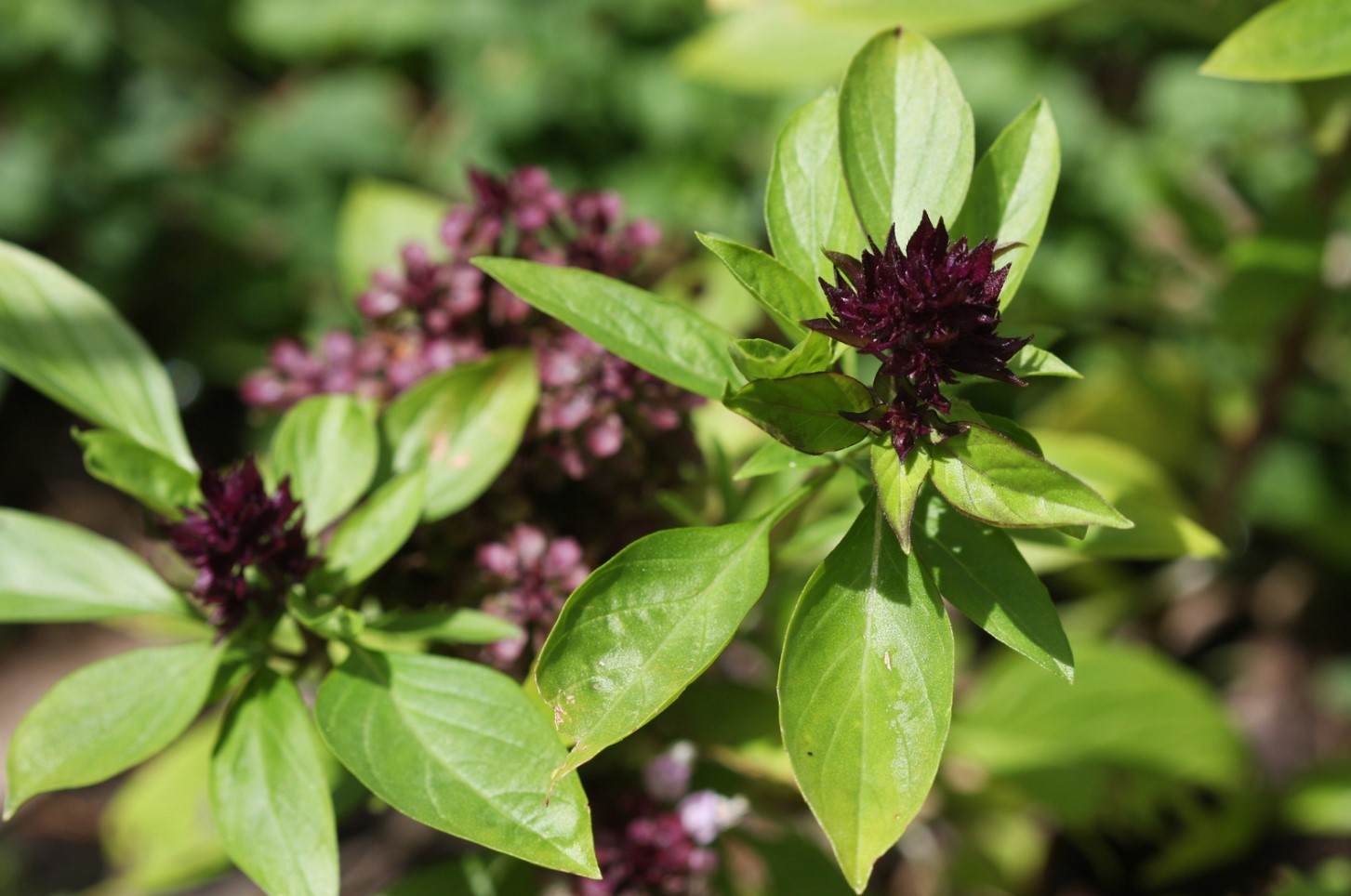
Antioxidant Properties Of Basil
Basil is a popular herb in the mint family that is commonly used as a seasoning in cooking. In addition to its culinary uses, basil has been found to have many health benefits. One of its key benefits is its antioxidant properties.
Antioxidants are compounds that help protect the body’s cells from damage caused by free radicals. Free radicals are unstable molecules that can damage cells and contribute to the development of diseases such as cancer and heart disease. Basil contains many different antioxidants, including vitamins A and C, beta-carotene, and flavonoids.
- Vitamin A helps to support healthy vision, immune function, and skin.
- Vitamin C is important for immune function, skin health, and wound healing.
- Beta-carotene is converted to vitamin A in the body and helps to support healthy vision, skin, and immune function.
Flavonoids are a type of antioxidant that can help reduce inflammation and prevent damage to cells. Basil contains flavonoids such as orientin and vicenin that have been found to have antioxidant properties.
In addition to its antioxidant properties, basil has been found to have many other health benefits. Adding basil to your meals is an easy way to incorporate this healthy herb into your diet and improve your health.
Anti-inflammatory Properties Of Basil
Basil, a herb often used as a seasoning in various cuisines, is known not only for its refreshing aroma and flavor but also for its numerous health benefits. From improving cardiovascular health to acting as an appetite stimulant, basil has been valued in traditional medicine for its medicinal properties for centuries. One of the most noteworthy health benefits of basil is its anti-inflammatory properties.
Inflammation is the body’s natural response to injury, infection, or stress, but chronic inflammation can result in a range of health complications. Studies have shown that various compounds found in basil, particularly eugenol, rosmarinic acid, and beta-caryophyllene, have anti-inflammatory effects that can help reduce inflammation in the body.
- Eugenol: An essential oil found in basil, eugenol has been found to have anti-inflammatory and analgesic properties, making it useful for managing pain and inflammation in conditions like arthritis and osteoporosis.
- Rosmarinic acid: This compound found in basil has been shown to inhibit the production of pro-inflammatory cytokines and enzymes, reducing inflammation in the body.
- Beta-caryophyllene: This compound, found in basil and other herbs, has been found to have potent anti-inflammatory and antioxidant properties that may help prevent chronic inflammation and associated diseases like cancer, Alzheimer’s, and heart disease.
While basil is not a substitute for medical treatment, it can supplement conventional treatments to help alleviate inflammation and related symptoms. Incorporating fresh or dried basil into your diet or taking basil supplements may be an effective and natural way to improve your health and reduce inflammation.
| Variety of Basil | Flavor Profile |
|---|---|
| Sweet Basil | Sweet, slightly peppery |
| Thai Basil | Strong, sweet, licorice-like |
| Lemon Basil | Lemony, slightly sweet |
| Cinnamon Basil | Sweet, spicy, cinnamon-like |
| Genovese Basil | Mild, sweet, slightly peppery |
The best way to harness the anti-inflammatory properties of basil is to incorporate it into your daily diet. Try adding fresh basil leaves to salads, sandwiches, and pasta dishes, or infuse olive oil with basil for a flavorful and nutrient-rich drizzle. You can also make a cup of basil tea by steeping fresh or dried basil leaves in hot water for a few minutes. Lastly, don’t forget to experiment with different varieties of basil to add a unique flavor profile to your dishes!
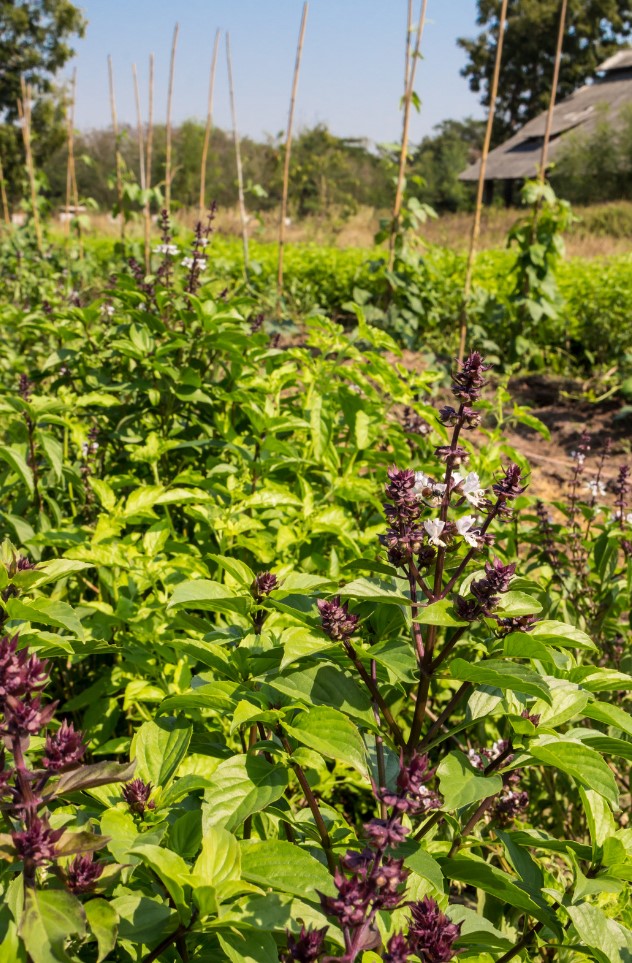
Quality Of Sleep Improved By Basil
Basil is a fragrant herb that has been used for centuries to enhance the flavor of dishes. However, this herb is not only delicious but also has numerous health benefits. One of the most significant benefits of basil is its ability to improve the quality of sleep. It is known to have a calming effect on the mind, body and soul, which helps to promote sound sleep.
Studies have shown that basil contains compounds that can work as natural sedatives, thereby promoting relaxation and reducing stress levels. This helps in inducing sleep and improving the quality of sleep. Basil acts as a natural muscle relaxant and helps to relieve muscle tension. This can be particularly beneficial for those who suffer from sleep disorders such as insomnia, restless leg syndrome or sleep apnea.
- Basil can be taken in several forms to experience its sleep benefits.
- Drinking basil tea before bed can help to relax the body and mind, allowing for better sleep.
- Adding fresh or dried basil to your meals can also help to promote sleep.
- Basil essential oil can be used in aromatherapy to calm the mind and promote relaxation.
Basil also has a number of other health benefits that can contribute to better quality of sleep. It is known to have anti-inflammatory and immune-boosting properties, which can help to reduce pain and inflammation that might disrupt sleep. Additionally, basil has antibacterial and anti-fungal properties that can help to prevent infections that may interfere with sleep.
| Benefits of Basil for Improved Sleep |
|---|
| Acts as a natural muscle relaxant |
| Reduces stress and promotes relaxation |
| Has anti-inflammatory properties that can reduce pain and inflammation |
| Supports the immune system to prevent infections |
Incorporating basil into your daily routine is easy, and the benefits are numerous. Whether you add a few fresh leaves to your meals or drink a soothing cup of basil tea before bed, this herb can help you to achieve a peaceful night’s sleep. With its natural sedative effects, anti-inflammatory properties, and immune-boosting benefits, basil is truly a powerful herb that can help to improve your overall health and well-being.
Digestive Health Improvement Due To Basil Consumption
Basil, a fragrant herb commonly used in cooking, has been shown to have numerous health benefits. One of the most notable benefits is its ability to improve digestive health. Studies have found that consuming basil can aid in digestion and relieve digestive discomfort.
One reason for this benefit is the presence of compounds in basil that have anti-inflammatory and antimicrobial properties. When consumed, these compounds can help reduce inflammation in the gut and combat harmful bacteria in the digestive system, leading to improved digestive health.
- SCROLL DOWN FOR MORE
- LIKE AND SHARE
- COMING SOON
Another way in which basil can improve digestive health is through its essential oils. Basil essential oils contain compounds that can stimulate the digestive system and increase the production of digestive enzymes. This can lead to more efficient digestion and the prevention of digestive issues such as bloating and gas.
In addition to its digestive benefits, basil is also a rich source of vitamins and minerals that are important for overall health. These nutrients include vitamin K, vitamin A, calcium, and iron. Consuming basil regularly can help boost your nutrient intake and support overall well-being.
| NUTRIENTS | PER SERVING |
|---|---|
| Vitamin K | 88% of the Daily Value |
| Vitamin A | 175 IU |
| Calcium | 2% of the Daily Value |
| Iron | 1% of the Daily Value |
Incorporating basil into your diet is easy and can be done in a variety of ways. Fresh basil can be added to salads, sandwiches, and pasta dishes, while dried basil can be used as a seasoning for soups, stews, and sauces. Alternatively, you can enjoy the benefits of basil by drinking it in the form of tea or adding it to smoothies.
Overall, consuming basil is a simple and effective way to improve your digestive health and support your overall well-being. So why not start adding a sprinkle of basil to your meals today?
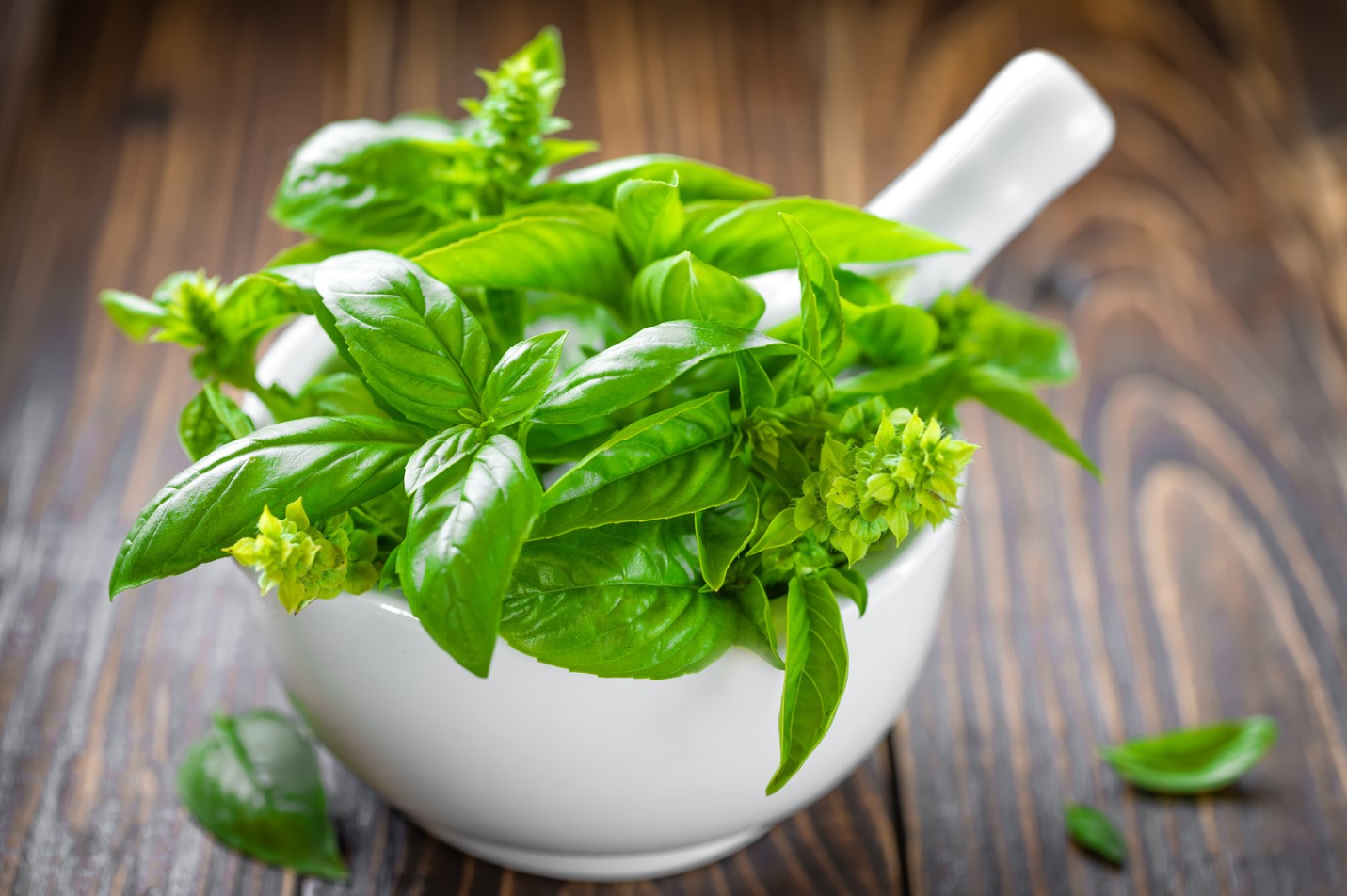
Cardiovascular Benefits Of Basil
Basil, a herb that is commonly used in cooking, has various health benefits, one of which is its ability to promote cardiovascular health. Basil contains vitamins and minerals like vitamin A, vitamin C, magnesium, and potassium, which are beneficial for heart health. These nutrients work together to help reduce blood pressure, prevent the buildup of cholesterol in the arteries, and improve blood flow to the heart.
In addition to the vitamins and minerals found in basil, it also contains powerful antioxidants that help protect the heart from damage caused by free radicals. Free radicals are unstable molecules that can cause cellular damage, which may lead to chronic diseases such as heart disease.
Basil also has anti-inflammatory properties that can help reduce inflammation in the blood vessels and prevent the development of atherosclerosis. Atherosclerosis is a condition in which plaque builds up in the arteries, causing them to narrow and harden, which can lead to heart attacks and strokes.
- Basil contains nutrients like vitamin A, vitamin C, magnesium, and potassium, which are heart-healthy.
- The antioxidants found in basil help protect the heart from damage caused by free radicals.
- Basil’s anti-inflammatory properties can help prevent the development of atherosclerosis in the arteries.
| Basil Recipe | Ingredients | Instructions |
|---|---|---|
| Basil Pesto Pasta |
|
|
If you are looking to incorporate more basil into your diet, there are many ways to do so. You can use it as a topping for pizzas or add it to your salads. You can also make a delicious basil pesto sauce to enjoy with pasta or as a dip for vegetables. With its many health benefits and versatility in cooking, basil is a great addition to any diet.
Antibacterial And Antifungal Properties İn Basil
Basil is a popular herb used worldwide in various dishes such as pesto, caprese salad, and marinades. But the herb isn’t only known for its great taste, it also has several health benefits. One of the most impressive benefits of basil is its antibacterial and antifungal properties.
The essential oils found in basil contain compounds that fight harmful bacteria and fungi. These compounds can help prevent the growth of a variety of harmful strains of bacteria and fungi, including Staphylococcus aureus and Candida albicans. Basil’s antibacterial and antifungal properties are so potent that it can even help protect food from spoiling.
Studies have shown that the essential oils in basil can also be effective in treating infections caused by bacteria and fungi. One study even found that basil essential oil was more effective than a commonly used antibiotic in treating a strain of bacteria that is resistant to many antibiotics.
- Basil’s antibacterial and antifungal properties help prevent the growth of harmful bacteria and fungi
- The essential oils in basil can be effective in treating infections caused by bacteria and fungi
- Basil essential oil was found to be more effective than a commonly used antibiotic in treating a strain of bacteria that is resistant to many antibiotics
In addition to its antibacterial and antifungal properties, basil also has many other health benefits. It is high in antioxidants, which help protect the body from damage caused by free radicals. Basil is also a good source of vitamins A and K, as well as calcium and iron. Adding basil to your diet can help boost your immune system and improve your overall health.
Whether you’re using fresh basil leaves or basil essential oil, incorporating it into your daily routine can have a great impact on your health. Try adding it to your meals or diffusing the essential oil in your home to reap the antibacterial and antifungal benefits of basil.
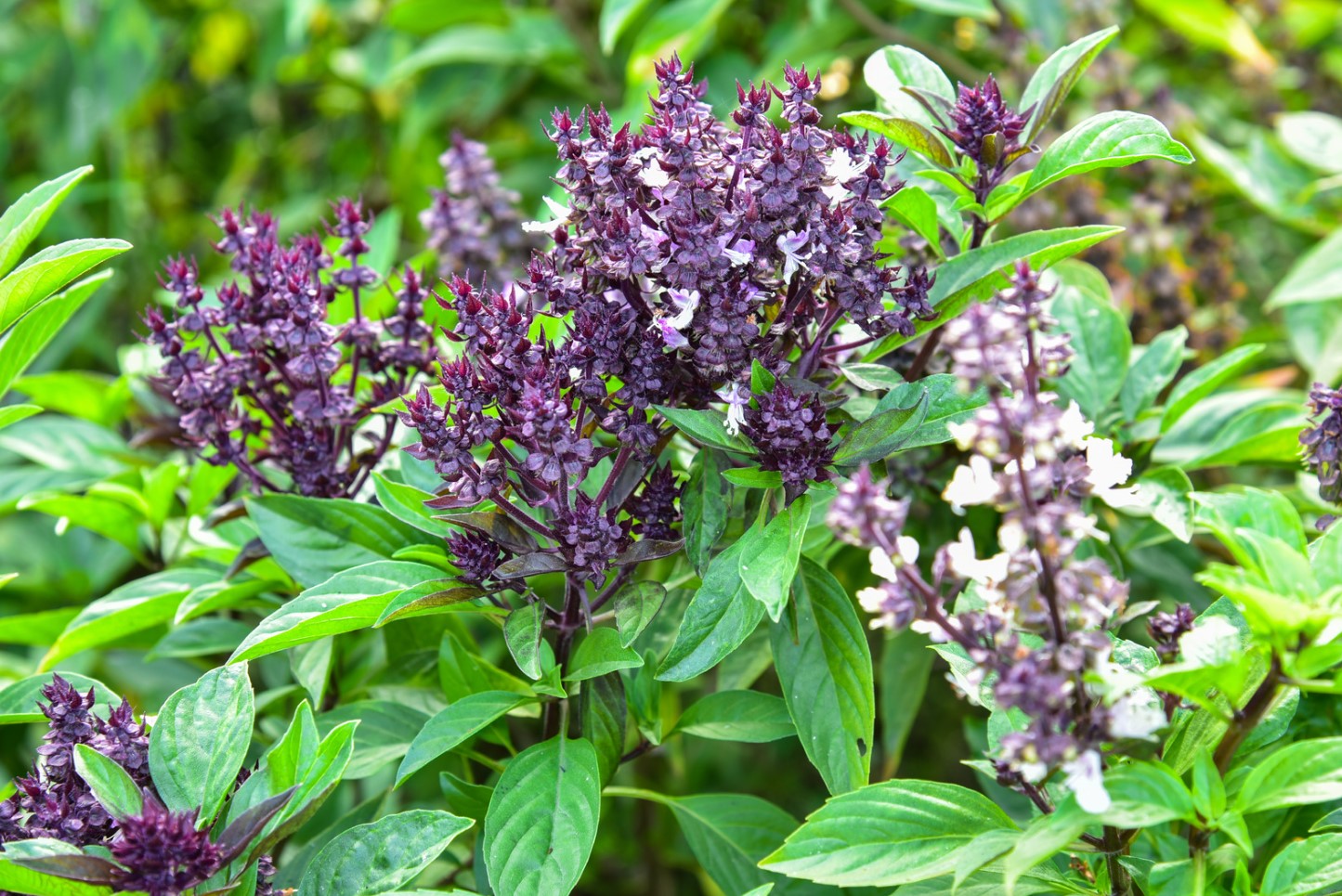
As An Appetite Stimulant: How Basil Can Help Rejuvenate One’s Cravings
Basil is an herb that is commonly used in cuisine worldwide. Although it is popularly known for its aroma and flavor, it has the potential to be used for its various health benefits. One of the most interesting benefits of basil is its ability to act as an appetite stimulant. In this article, we will explore how basil can help rejuvenate one’s cravings.
Before we dive into the details of how basil can stimulate one’s appetite, let’s first understand what an appetite is. Appetite is the desire to eat food, and it is controlled by various factors such as hormones, emotions, and the environment. Sometimes, due to various reasons, one may lack the desire to eat food, leading to loss of appetite. This is where basil can come in handy.
Basil contains a compound called eugenol, which has been found to stimulate the production of digestive enzymes. Essentially, this means that basil can help improve the digestion of food by increasing the secretion of digestive juices. When food is properly digested, it can help increase one’s appetite and also promote better nutrient absorption. Furthermore, the aroma of basil can also help stimulate the salivary glands, which can enhance the taste of food and make it more appealing.
- One way to incorporate basil into your daily diet is by making a basil pesto. Pesto can be used as a spread or added to pasta to enhance its flavor.
- You can also add basil leaves to your salads, soups, or stews to improve their taste and aroma.
- Drinking basil tea can also help stimulate your appetite. To make basil tea, steep a few basil leaves in hot water for a few minutes and enjoy this simple but effective remedy.
In conclusion, basil is more than just a flavoring agent; it has the potential to provide many health benefits. Its ability to act as an appetite stimulant makes it a valuable herb in promoting overall well-being. By incorporating basil into your daily diet in various forms, you can potentially boost your appetite and improve your digestion, leading to a healthier and happier life.
Basil’s Role İn Boosting Immunity Levels
Basil, which is also known as Ocimum basilicum, is an herb that originates from India and other tropical regions of the world. This herb has been used for thousands of years in different cultures for its culinary and medicinal purposes. One of the most important benefits of basil is its ability to boost the immune system.
The reason why basil is beneficial for the immune system is that it contains many essential vitamins and minerals that are required by the body to maintain optimal immune function. It is particularly rich in vitamin C, vitamin A, calcium, and iron. These nutrients are crucial for the production of white blood cells, which are the cells that fight off infection and disease in the body.
- Basil is also rich in antioxidants that help to protect the body against oxidative stress and damage caused by free radicals. This damage can weaken the immune system and make the body more susceptible to illness and disease.
- Furthermore, basil contains essential oils such as eugenol, limonene, and citral, which have antimicrobial properties that can help to fight off harmful bacteria, viruses, and fungi in the body.
- If you want to boost your immunity levels, you can easily incorporate basil into your diet by adding it to your meals or beverages. You can use fresh basil in salads, soups, pasta dishes, and even smoothies.
| Nutrients in Basil | Amount per 100 grams |
|---|---|
| Vitamin C | 18 mg |
| Vitamin A | 264 IU |
| Calcium | 177 mg |
| Iron | 3.17 mg |
Basil is a herb that is not only delicious but also has numerous health benefits. Its ability to boost the immune system makes it an essential ingredient in many traditional medicines. So, if you want to strengthen your immune system and stay healthy, make sure to include basil in your diet regularly.
Potential Cancer Prevention Properties Of Basil
Basil, a flavorful herb often used in the culinary world, has been shown to have several medicinal properties. One of the most significant benefits of basil is its potential to prevent cancer. With cancer being one of the leading causes of death worldwide, preventative measures such as incorporating basil into one’s diet can be helpful.
Anticancer Properties
Basil has been found to contain several compounds that possess anticancer properties. These compounds include rosmarinic acid, apigenin, eugenol, and luteolin. The antioxidant and anti-inflammatory properties of these compounds play a significant role in preventing cancer.
Apoptosis and Tumor Growth Inhibition
Studies have shown that basil extracts can induce apoptosis, or programmed cell death, in cancer cells. This process prevents the uncontrolled growth of cancer cells and inhibits tumor growth. Additionally, basil extracts have been found to inhibit angiogenesis, the process by which new blood vessels form in tumors, leading to their growth and spread.
- Rosmarinic acid, one of the compounds found in basil, has been shown to inhibit the growth of several types of cancer cells, such as breast, liver, and colon cancer.
- Eugenol, another compound found in basil, has been found to possess anticancer properties against prostate cancer.
Conclusion
The potential cancer prevention properties of basil are promising. Research has shown that incorporating basil into one’s diet may help prevent the development and growth of certain types of cancer. In addition to its culinary uses, basil can also be consumed in other forms, such as capsules or extracts. However, further research is needed to fully understand the anticancer properties of basil and its potential as a cancer preventative measure.
Therapeutic Benefits Of Basil’s Essential Oils
Basil has long been recognized for its incredible medicinal properties. This aromatic herb has been used in traditional medicine practices for centuries due to its therapeutic benefits. Basil’s essential oils, in particular, have been shown to have a wide array of healing properties.
Studies have found that basil oil can be effective in alleviating headaches, reducing anxiety and depression, and improving respiratory function. Its anti-inflammatory properties also make it useful in relieving pain and swelling caused by arthritis and other inflammatory conditions.
Basil oil has also been shown to have antimicrobial properties, making it effective in fighting off pathogens such as bacteria and fungi. It has even been found to be effective against antibiotic-resistant strains of bacteria.
- Inhaling basil oil can help to clear the sinuses and improve breathing. Adding a few drops of basil oil to a diffuser or facial steam can provide relief from respiratory congestion and coughing.
- Topical application of basil oil can help to alleviate pain and swelling caused by conditions such as arthritis, gout, and sprains.
- Basil oil can also be used as a natural insect repellent. Its strong aroma is effective in keeping mosquitoes, flies, and other pests at bay.
If you are interested in incorporating basil’s essential oils into your daily health routine, there are a number of ways to do so. Adding a few drops of basil oil to your bath water can help to relax your muscles and soothe your mind. You can also mix a few drops of basil oil with a carrier oil such as coconut or olive oil to create a natural massage oil for pain relief or stress reduction. Alternatively, you can add a few drops of basil oil to your aromatherapy diffuser to create a calming and uplifting atmosphere in your home or office.
Basil’s essential oils offer a wide range of therapeutic benefits, making it a valuable addition to any health and wellness routine. Whether you are looking to alleviate pain, reduce stress and anxiety, or ward off pests, basil oil may be a natural solution for your needs.
Basil İn Cosmetics And Personal Care Products
Basil has been used for centuries in cooking, medicine and spiritual rituals. But did you know that basil also has a role in cosmetics and personal care products? Basil has antibacterial and anti-inflammatory properties, making it an ideal ingredient for skincare products.
Studies have shown that basil extracts can help reduce acne, skin inflammation and redness. This herb is also rich in antioxidants, such as flavonoids and phenolics, which protect the skin from environmental factors that can cause premature aging. Basil extracts have been found to help firm and tighten the skin, giving it a more youthful appearance.
Basil’s essential oils also have a role in personal care products. Basil oil is often used in perfumes and aromatherapy products. Its fresh, herbaceous scent is known to improve mood and reduce stress. Basil oil is also used in hair care products, as it can help promote hair growth and prevent hair loss.
| Basil Personal Care Products | Benefits |
|---|---|
| Face Masks | Reduces acne and inflammation, improves skin firmness and tone |
| Anti-Aging Creams | Protects skin from environmental factors, reduces the appearance of fine lines and wrinkles |
| Shampoos | Promotes hair growth, prevents hair loss, contains antibacterial and antifungal properties to improve scalp health |
Incorporating basil into your personal care routine can have numerous benefits for your skin and hair. Look for skincare and hair care products that contain basil extracts or essential oils, or try making your own DIY basil-infused products at home.
However, it’s important to note that basil can also cause skin irritation or allergic reactions in some people. Before using basil products on your skin or hair, do a patch test and consult with a dermatologist if you have any concerns.
How To Incorporate Basil İnto Your Daily Diet: Recipes & Tips
Basil is an extremely versatile herb that can add a burst of flavor to almost any dish. Incorporating basil into your daily diet not only enhances the taste of your meals, but also provides numerous health benefits. Here are some easy recipes and tips on how to include this flavorful herb into your everyday meals.
- Basil Pesto: Pesto is a classic way to use basil and can be added to pasta, sandwiches, pizzas, or used as a dip. To make your own pesto, blend together basil leaves, pine nuts, garlic, Parmesan cheese, and olive oil until smooth.
- Basil Dressing: Add a tablespoon of finely chopped basil to your favorite vinaigrette dressing for a refreshing twist.
- Basil Infused Water: Adding fresh basil leaves and slices of lemon or cucumber to your water can help you stay hydrated and add a touch of flavor to your drink.
You can also use basil to flavor your meats, vegetables, and grains. Here are some more tips on incorporating basil into your meals:
- Top your omelet: Add chopped basil along with some cheese and tomatoes to your omelet for a flavor-packed breakfast.
- Add to soups and stews: Basil can be added to vegetable soups, lentil stews, or even chicken noodle soup.
- Toss into salads: Add fresh basil leaves to your green salad for a burst of freshness.
- Make a Caprese salad: Use slices of fresh mozzarella, tomatoes, and basil leaves to make a simple yet delicious salad.
- Basil as a garnish: Add a sprig of basil to your Bloody Mary or other cocktails for a fresh and vibrant presentation.
Basil is a delicious and nutritious herb that can be incorporated into your daily diet in many ways. Experiment with using it in your meals and discover your new favorite recipe!